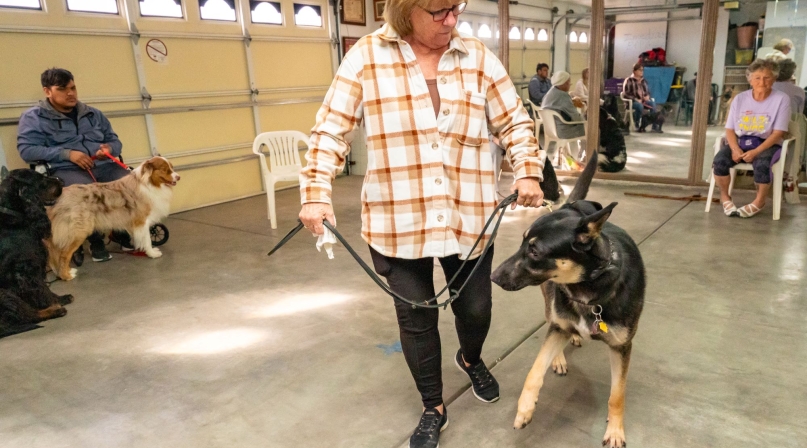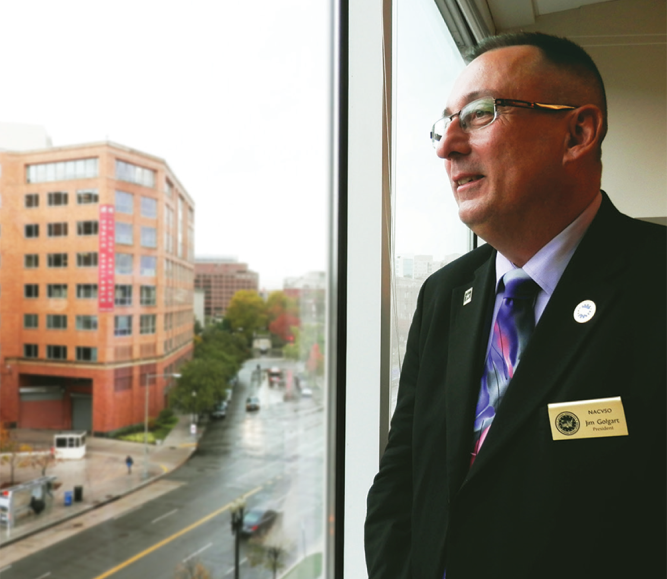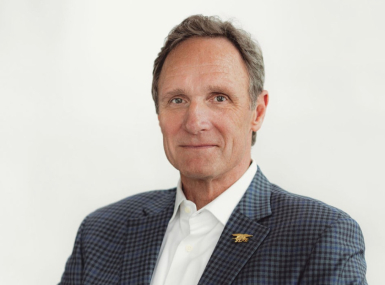County-backed service dog program aids local veterans

Key Takeaways
Brad Askren couldn’t go to the hardware store, the grocery store — anywhere where there could be a check-out line. Askren has post-traumatic stress disorder from his time serving in the military, and his biggest trigger is being startled by someone standing behind him. The panic that subsequently set in was debilitating.
“I didn’t go to the store, I would avoid it,” Askren said. “I didn’t eat properly. I basically didn’t go in public.”
Then, he met Tynia Dickson, a dog trainer and fellow Nye County, Nev. veteran. Dickson, the owner of a dog-training business called The Sassy Trainer, had taken up training service dogs for veterans as a passion project. She dubbed the initiative the Personally Trained Service Dogs (PTSD) program, “to give a better face to PTSD,” she said.
Askren’s 5-pound chihuahua Cara wasn’t exactly what comes to mind when people think “service dog,” but taking up Dickson’s offer to train her into one changed his life, he said.
Through the PTSD program, Cara learned to nuzzle Askren in the leg when someone stepped behind him in public, signaling him to turn his back to a “safe” direction, giving him a newfound freedom.
“I got to almost feel normal,” Askren said. “That sounds silly, but when you can’t go [anywhere] in public because you’re triggered that much and then can go almost anywhere you want and not really worry about it, because you know that you’re going to get notified and be able to adjust the situation to prevent that trigger — it’s absolutely freeing.”
Dickson echoed Askren’s desire to feel “normal” again after serving in the military. A study found that 23% of veterans using Veterans Affairs services reported experiencing PTSD at some point in their lives.
“Most of us, before we became soldiers, had a certain level of health or competence,” Dickson said. “For lack of a better way to put it, we felt ‘normal,’ we were just people. But you go into the service and sometimes you have to deal with the general public hating you for the fact that you are a soldier, you have to deal with conflict, with death, injuries, limb loss, loss of friends, being assaulted, shot, stabbed — just horrific experiences — and it changes you.
“And what I’m finding is a dog gives veterans something else to think about, to worry about, to take care of, just fundamentally, which is empowering. And then the dog reciprocates with whatever aid that the person might need — hearing, sight, mobility, PTSD, seizures — so it’s a mutually beneficial relationship.”
Having a service dog removes the uncomfortable barrier of asking for help, and returns a sense of independence to veterans, Dickson said.
“As a person, when you have to ask another person for something, you can feel needy or burdensome,” Dickson said. “But your dog is there saying ‘What are we gonna do next?’ People don’t feel like their dog is ‘put upon.’ They feel like they’re in a relationship and a team where they do it together, so that empowers people to want to do more.”
The program’s training is specialized to each dog and their owner, but all plans include a “lecture” section, which usually focuses on dog behavior and the reciprocal relationship between a service dog and their owner, and a “practical” section, which is the more hands-on part of the process. The dog goes where the owner goes — their favorite restaurant, the doctor’s office, the grocery store — so that they become accustomed to their owner’s day-to-day.
Going through the service dog training benefited Askren just as much as it did Cara, he said; it created a sense of stability in his life and challenged him to improve his communication skills. Cara has since passed away, but he still applies what he learned in training to his everyday life, he said.
“You have to get up and go to class to progress,” Askren said. “So, for people who are really in a bad spot, it makes them go do something and interact with other people and dogs.
“Without Tynia helping me, I don’t think I’d be where I am today. The PTSD program has drastically changed my life.”
Askren enjoyed the process so much that, even after he and Cara “graduated,” he stuck around as a helping hand to Dickson as she trained other veterans and their service dogs. He would still be involved with the program if he hadn’t moved out of Nevada, he said.
“Most of the time, I don’t enjoy being around other people, but in that scenario, I liked being around people and their dogs,” Askren said. “I see a lot of need for it in the community. There are a lot of veterans in that area, which is nice, because there are a lot of people who I have a common experience with … so when you saw someone really struggling with things like PTSD and anxiety, it was nice to be able to interact and help and watch the growth of that person with their service dog as a team.”
Dickson created the veteran service dog program after decades of having service dogs for PTSD and mobility issues with her hands and hips. A veterans organization connected her to her first dog, a Black Labrador Retriever named Davidson, when she went to college.
“He was tall and skinny and a very happy go lucky guy,” she said. “He would carry my books and he helped me stay stable when I was going from class to class. After that first dog got me through college, I was like, ‘Wow, this is empowering and freeing,’ and if I could ever have an opportunity to give back, I would.”
When Dickson created the program, she implemented a “pay-what-you-can” system so that any veteran who wanted to get their dog trained could, which often resulted in highly discounted rates or training for free. Nearly 13% of people in Nye County are veterans — more than double the national average, according to U.S. census data.
“I realized, because I am a veteran, that veterans don’t have a lot of money necessarily,” she said. “If people come to me and say, ‘Look, I really can’t afford to keep doing this.’ I tell them, ‘Come anyway.’”
Following the encouragement of Dr. Tom Waters, the chairman of Nye County’s Veteran’s Finance Committee, Dickson applied for a $20,000 grant through the county so that five veterans who struggle with PTSD could have their dogs trained at no-cost, with Dickson still being properly compensated. The Nye County Commissioners unanimously approved the funding.
“It made me feel like I was wanted by the community,” Askren said. “It meant a lot that they invested in us [veterans].”
Nye County Commissioner Ron Boskovich attended a class of PTSD service dogs’ graduation last year after he voted to help fund the program. Boskovich, a self-proclaimed “staunch supporter of animals,” has a pet chihuahua named Coco Chanel.
“This is such a great program,” Boskovich said. “We have an awful lot of veterans here who are lacking support in one way or another, whether it be because of our budget constraints or just the fact that Nye County as a whole doesn’t have quite the infrastructure that larger places, like Clark County might have … so for folks in need, whether they have PTSD or are potentially just in a bad place, it can really come in handy for them.”
Lynn Cartwright, a veteran with mobility issues who graduated from the program with her service dog in March, said cost was a concern for her when she first heard about the program, and she was ecstatic to find out that the county was contributing to funding.
“It just makes you feel good knowing that the county is there to support you,” she said.
Cartwright has had a hip replacement and two knee replacements since her time in the military and she has to use a cane to get around. Because of neck and back pain, she can’t carry around a purse, so her service dog, a Boxer named Emma, carries Cartwright’s medicine around in a little pouch.
“Having her with me gives me extra confidence in going out and getting things done,” Cartwright said. “When I get ready, she knows that she’s coming with me, and she knows that she’s got a job to do.”
Cartwright is sometimes left bed-ridden because of her disabilities, and Emma helps provide her with emotional support as well as physical support.
“Emotionally, knowing you’ve got that support there at home, just makes getting through the day a lot easier,” Cartwright said. “It makes you feel like you’re not so alone.”
Dickson said she meets dogs and owners where they are; if the owner doesn’t give up, neither does Dickson. She recounted the training of a man and his particularly unruly dog who she wasn’t sure would ever “graduate” into becoming a service dog.
“He came in with a very out of control dog, and almost every day when he came in, he had a new bruise and was bleeding, because the dog was so out of control,” Dickson said. “But there was that day — and it’s almost always a day that you can point to, to say, ‘That’s the turning point’ — it happened, and he turned into a caregiver.”
The owner has since passed away, but the two created a beautiful relationship that helped bring him comfort while he was in hospice.
“He would lay with him, and if he dropped something, he’d jump right down and pick it up and give it to him,” Dickson said. “He was just there up until the very end and was very attentive. It was amazing. It was just sad that it was such a short period of time that they were working together as such a good team.”
Being a part of strengthening that kind of relationship is why Dickson does what she does.
“That’s what makes it worth getting up in the morning,” she said.
County News
A closer look at the role of the county veterans service officer

Related News

Counties Mark Five Years of Operation Green Light for Veterans
County buildings and landmarks light up in green November 4-11, showing support and highlighting resources available for veterans and their families

Highlights from 2025 Operation Green Light for Veterans
Operation Green Light for Veterans returns. Explore highlights from counties across the country.

County service meets a veteran’s need for purpose in Spotsylvania County, Virginia
After Drew Mullins transitioned from a high-performance lifestyle in the military, he found the environment and purpose he sought when he took office in his county.
